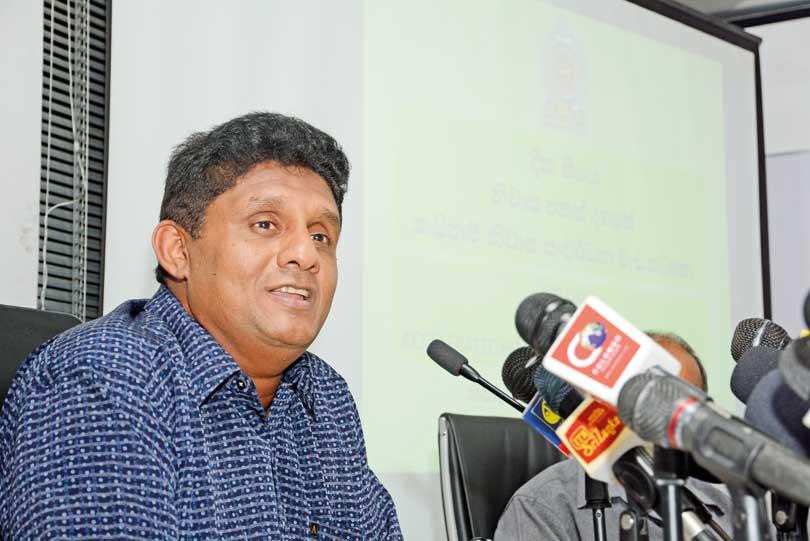Sajith has an unfinished job to finish
9 October 2019 01:12 am Views - 547

“Finish the work, otherwise an unfinished work will finish you.” ~ Amit Kalantri (Indian author)

Sajith Premadasa has to realise that if he were to win the presidential election, he has just finished one short journey but the long and challenging trek could be daunting and extremely tiring. Does he have the stamina left in him after a grueling campaign to embark on another journey of statecraft and good governance? This is the question people ask and it is the question Sajith alone can answer. Meandering along with no clue whatsoever, an unflattering trait the current holder of presidential office is known for, is not an option.
- Those who are fondly remembered by the masses did not arrive at their respective citadels by accident
- Our leaders of yesteryear have chosen to play politics like a game of casino, heads I win, tails you lose
- When Rajapaksas play the patriotism card, Sajith must play the same with double the fury and fire
Sri Lanka has to decide as one nation, Sinhalese, Tamil, Muslim and Burger, Buddhist, Christian and Hindu altogether, whether to go forward or turn back on the fundamental human rights and democratic principles that were fought for and ensured for some time. Nothing that is given on a platter would last. Gifts and donations are of mere temporary value. Their shelf-life is utterly momentary and their fleeting quality does not attract the curious buyer. Those who are fondly remembered by the masses did not arrive at their respective citadels by accident; such accidental arrivals, as is being aptly demonstrated by the incumbent President, cannot sustain the glory and discredit, if any, for a time of any worth.
Masses pay Pooja to their leaders not because they love them unconditionally but because they expect to get their return on investment by way of time, money and sweat. There is no, as the saying goes, free lunch. The cost of the lunch has to be borne by someone, known or unknown, and its cost does not disappear just because the ultimate consumer does not pay it. We have become an entitlement-driven, entitlement-greedy and entitlement-oriented nation. Our leaders of yesteryear have chosen to play politics like a game of casino, heads I win, tails you lose.
Real transformation of a national character is not consummated in mere five years nor is it achieved in two terms in political office. Structures and processes that produce such transformation need to be installed and erected; their installation could be impeded at each of the steps that lead to it; yet the effort and determination to obtain the desired result cannot afford to be sacrificed at the altar of expediency and convenience. The masses would not show the same degree of patience and apathy when it comes to deliverance of pledges so made on political platforms.
Despite being thrown out at successive elections, our political leaders have gleefully accepted the irrational norms of current political tapestry that has been woven by a proportional representation system that continues to return to Parliament some dreadful characters whose qualifications are extremely questionable on the one hand and woefully inadequate on the other.
Possession of incalculable wealth and assets amounting to closeness to other political bigwigs, these charlatans have been entrenched in our society for a number of decades and their influence on sponsored-politicos has assured they could have a free-show each evening with wine, women and song, making Kahlil Gibran turn in his grave. Sajith Premadasa has to appeal to those who have opted to defy such decadence and anachronisms. His father had only a handful of friends amongst the elite; English-speaking, Colombo-educated pukka sahibs. Their character is one made of straw and paper which dissolve in the face of tiniest of tempests. In order to break the stranglehold of this useless but self-flattering garbage of humanity that reside in the glee and glamour of political favoritism, Sajith needs to arm himself with enormous self-confidence and willingness to run the extra yard. His father chose to challenge this brutal social parasite but was successful only to a very miniscule degree. Instead of challenging and outsmarting the Colombo-elite, he chose to fight his own friends within his own party and ultimately paid the supreme price for being too ambitious too soon.
Sajith, on the contrary, has the value of hindsight; his education at London School of Economics, his fluency in English and his formal education at Royal College, Colombo have given him license to mingle freely with the Colombo-elite yet being aloof of these dreadful social-cockroaches. To quote Kahlil Gibran in another context: ‘Out of suffering have emerged the strongest souls; the most massive characters are seared with scars’. Sajith has to stand aloof almost in a ‘Jayewardenesque’fashion yet relate to the masses in a very real and tangible mode that couldn’t be construed as mere public relations.
In other words, Sajith’s appeal to the majority of our people must be founded and buttressed on a promise to freeing the ‘small man’ (podi minisa) from the shackles of bondage and dependence. When the Rajapaksas play the patriotism card, Sajith must play the same with double the fury and fire. The phoney patriotism of the Rajapaksas can be exposed but it must be done at a consistent and continuous basis. The unsavory yet much-demanded job of elimination of financial corruption and misdeeds by the Rajapaksa-politicos and their henchmen is still on top of the priorities-list, though may not be amongst the UNP politicians, but they certainly occupy a prime place among the masses. That’s one unfinished job Sajith has to finish.
Any delay would be read by the ‘small man’ as appeasement or as honeymooning with the enemy. Such inglorious badges should not be worn by the candidate of the ‘small man.’ The stigma attached to the current UNP administration is this very tardy approach to the resolution of issues associated with corrupt practices introduced by the previous Rajapaksa regime and the masses have a right and thirst to know what precisely is happening with regard to the numerous allegations and charges so pinned to these corrupt politicians and their henchmen.
Under no circumstances should a ruling cabal be replaced by another that is perceived as more corrupt and insensitive. On the other hand, it might be extremely difficult to follow the exemplary work-ethic set out by Sajith’s father. R. Premadasa may have had many weaknesses but unwillingness to work hard and absence of a great sense of empathy for the ‘small man’ are not among them. R. Premadasa worked for the ‘small man’ but he couldn’t finish his job. On the other hand, it is not a job that can be finished but suspension of such work cannot be conceded on any account. Simplicity embraced by Premadasa Senior cannot be replicated but all attempts at being simple are no hard task for any politician.
However, duplicity, if veiled by a hazy and phoney simplicity, is not tolerable and I’m sure Premadasa Junior is quite sensitive to such socio-political demands of the twenty first century. Yet, before even thinking of what he might do after winning the election, he must first win the election. An unadulterated message of empathy, a degree of decorum and true commitment to real transformation of our society with fundamental focus on the ‘small man’ could very well carry him to victory. The journey has begun and many a step already taken; an expectant mass of ‘small men’ is eagerly looking forward to what might cascade from the lips of Premadasa Junior. Please don’t let them down.
The writer can be contacted at vishwamithra1984@gmail.com